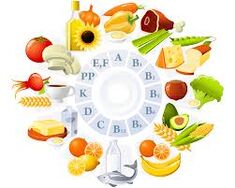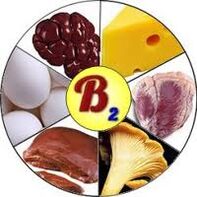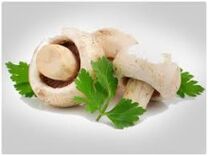
Everyone knows that vitamins are essential for our body, but few people know that these substances are needed for proper brain function. In addition, to maintain memory and thinking, Some groups of vitamins are required, which will be discussed below.
The most important B vitamins for memory
B vitamins are the most important for the nervous system. We can say that the representatives of this group have the most impact on a person's memory and thinking. They support the work of nerve cells, and early aging. Also, protect the brain from overload and stress. Low content or complete absence of B vitamins leads to severe disorders of the nervous system, impairing a person's memory and intelligence.
This group of vitamins includes the most important vitamins for the brain - B1, B2, B3, B5, B6, B9, B12.
Thiamine - Vitamin B1
Thiamine - Vitamin B1, called the "vitamin of mind", is the one that has the most effect on mental abilities and memory. Lack of this causes thoughts to become confused and memory is reduced. B1 directly protects the nervous system and is involved in providing glucose to the brain.
With a complete diet, a person does not lack this vitamin, as it is contained in a large number of products: oats and buckwheat (many in grains and bran shells), bran, peas, nuts. , Carrots, Radish, Beans, Potatoes. Spanners are suppliers of thiamine.

It is well absorbed, but also quickly and degraded, especially under the influence of alcohol, nicotine, sugar, tea tannins.
Symptoms due to vitamin B1 deficiency are:
- memory loss;
- muscle weakness;
- High physical and mental fatigue;
- impaired coordination and gait;
- numbness in the limbs;
- Improper irritability;
- sad mood;
- unrest and anxiety;
- sleep disorders.
In severe cases, polycysticitis, paralysis, and paresis of the extremities may develop. The function of the cardiovascular system is also impaired, changes in the gastrointestinal tract can be observed (feces, constipation, nausea).
riboflavin - vitamin b2
Vitamin B2 - Riboflavin is an "energy vitamin", an accelerator of energy and metabolism in our body, involved in accelerating mental processes in the brain, involved in the synthesis of nerve cells and neurotransmitters (biologically activeSubstances) that transmit nerve impulses. Into neural cells). With its deficiency, playing sports will lead to fatigue rather than vigor and hyperactivity. Vitamin B2 tolerates high temperatures well, but quickly in light. Gets spoiled
The suppliers of riboflavin are meat and dairy products. These are liver, kidneys, eggs, dairy products, yeast, tomatoes, cabbage, rose hips.

Vitamin B2 deficiency results:
- Headache;
- decreased speed of mental processes;
- sleepiness;
- loss of appetite;
- weight loss;
- weakness.
In addition, skin changes are seen - cracks and cracks in the corners of the mouth (colitis), dermatitis of the chest and facial skin; Visual disturbances - photophobia, inflammation of the cornea and lacrimation due to the mucous membrane of the eyes; The synthesis of adrenal hormones is inhibited.
Nicotinic Acid - Vitamin B3 or PP
Nicotinic acid (nicotinamide, niacin) - Vitamin B3 - can be called the "vitamin of calm". Vitamin is involved in the synthesis of enzymes and helps in extracting energy from food, its lack of body fatigue, Depression, depression, insomnia are experienced. In addition, nicotinamide is directly involved in the biosynthesis of hormones (estrogen, progesterone, cortisol, testosterone, insulin, and others).
An excessive amount of vitamin B3 is found in animal products: liver, eggs, kidneys, lean meat; A handful of vegetable products - asparagus, parsley, carrots, garlic, green peas, black pepper.
If it is absent in food, pellagra develops. The main symptoms of this condition are diarrhea (diarrhea), dermatitis (swelling on exposed skin surfaces), and dementia (acquired dementia).
Pantothenic Acid - Vitamin B5

Vitamin B5 - Pantothenic Acid - This vitamin is found in many foods. This vitamin is involved in the metabolism of fat, in the transmission of nerve impulses, and also triggers the mechanism of skin regeneration. It was believed that a person cannot lack this vitamin.
But given that more than half of pantothenic acid is destroyed during storage and cooking, the following symptoms may appear:
- numbness;
- memory loss;
- sleep disturbances;
- headache;
- paresthesias (tingling) of hands and feet;
- muscle pain.
For vitamin B5 deficiency, you need to include a variety of foods in the diet: meat, whole sprouted grains, hazelnuts, offal, yeast. Flakes, fresh vegetables, mushrooms, significant amounts of green teaIs found.
Pyridoxine - Vitamin B6
Vitamin B6 - pyridoxine - is involved in the synthesis of neurotransmitters including serotonin. Therefore, its second name is "Vitamin Antidepressant".
deficiency causes the following symptoms:
- sleepiness;
- irritability;
- prohibition of thinking;
- depression;
- feeling of anxiety.
Vitamin B6 is found in large quantities in yeast, grains, legumes, bananas, meat, fish, potatoes, cabbage, peppers, cherries, strawberries.
In addition, vitamin B6 affects metabolism, cardiovascular system status, immunity, skin conditions, synthesis of hormones, absorption of hydrochloric acid and vitamin B12 in the stomach.
Folic Acid - Vitamin B9

Folic acid - Vitamin B9 - is involved in the synthesis of neurotransmitters, including dopamine and serotonin, that is, it affects the processes of stimulation and inhibition in the central nervous system. In addition, the exchange of vitamin B9 protein-Production involves the transfer of genetic information during fetal development, it is necessary for the formation of normal blood cells. And in combination with vitamin B5, it slows down the browning of hair.
If it is deficient, symptoms occur:
- memory loss;
- fatigue;
- feeling of anxiety;
- anemia;
- insomnia and apathy.
Folic acid is found in large amounts of fresh green vegetables (asparagus, spinach, lettuce), a lot of its fruits are found in beans, wheat, avocados and liver, small amounts in egg yolk.
Cyanocobalamin - Vitamin B12
In nature, it is synthesized only by microorganisms, bacteria, blue-green algae and accumulates mainly in the liver and kidneys of animals. Neither plants nor animals synthesize it. It is "red vitamin"Contains animal products: fish, liver, kidneys, heart, oyster, it is also found in seaweed, soy. Vitamin B12 helps our body to change from" waking "mode to waking up to normalize mental processes. Helps, transfer short term memory to long term memory.
Cyanocobalamin deficiency leads to:
- chronic fatigue;
- confusion;
- hallucinations;
- ringing in ears;
- irritability;
- dizziness;
- sleepiness;
- memory loss;
- visual impairment;
- dementia;
- depression.
Apart from B vitamins, there are other vitamins for memory and thinking.
ascorbic acid - vitamin C

Ascorbic acid is a very strong antioxidant and protects the body's cells from oxidative processes. Essential for maintaining the work of neurotransmitters in the brain.
Vitamin C is not synthesized in the body, it comes with food: rose hips, black current, sea buckthorn, parsley, sweet red pepper, citrus fruit, green onions, cabbage, horseradish, nettle, From animal products it is found only in the liver.
Tocopherol Acetate - Vitamin E
It is a fat-soluble vitamin, above all, an excellent antioxidant that removes toxins and free radicals from brain tissue. It is involved in the lipid composition of cell membranes. A diet rich in vitamin E-rich foodsHelps protect the body from heart attacks and atherosclerosis, leading to the development of dementia.
For this, unrefined oil (olives, soybeans, corn), as well as green peas, wheat and rye sprouts, beans, green lettuce, lentils and oats should be included in the diet.
Calciferol - Vitamin D
enters the body with food and is synthesized in the skin under the influence of ultraviolet rays. Calciferol is the "main conductor" of calcium metabolism in the body. In addition to its important effects on the formation of bones and teeth, nerve impulses andThe correct transmission of muscle contraction requires the growth and development of cells.
Large quantities present in animal products: butter, fatty fish (herring, tuna, salmon, mackerel), fish oil, liver, egg yolk.
Bioflavonoids - Vitamin P

The main effect of Vitamin P is to reduce capillary permeability and fragility. With ascorbic acid, it protects the body from oxidative processes. It prevents brain bleeding. Vitamin P citrus fruit, rose hips, Rich in black chokeberry, green tea, apple.
Balanced diet, in addition to the use of vitamins, we should not forget about other ways to prevent dementia. This is the only way to get a good memory, enthusiasm and optimism in old age.







































































